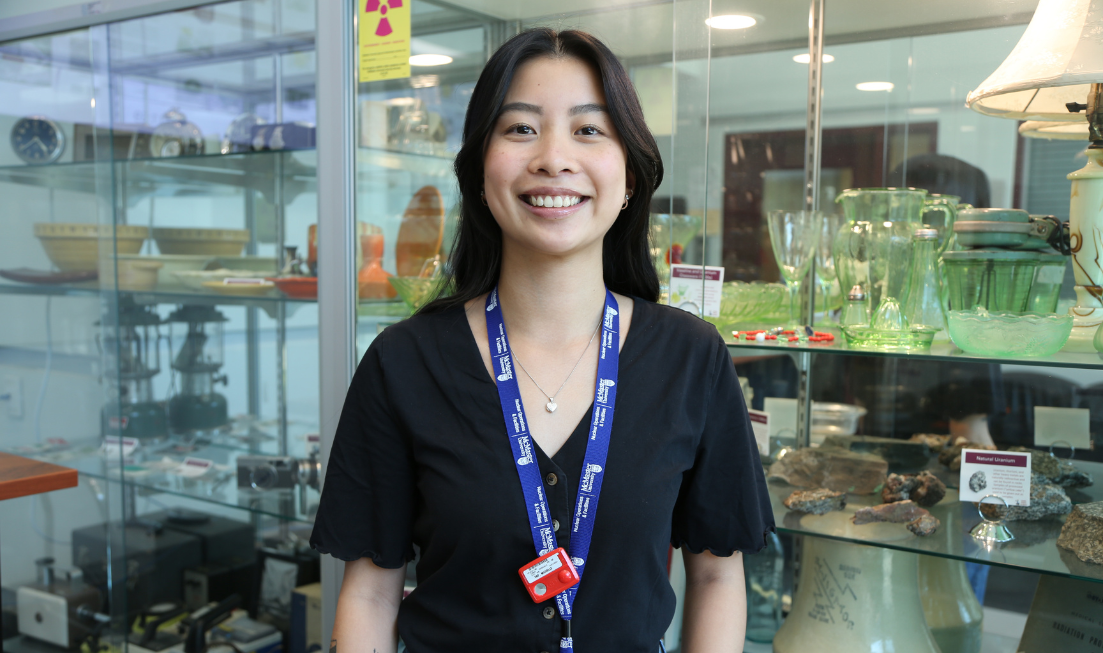Student guides bring new enthusiasm to reactor tours — and science

Graduate student Michelle Yap in front of the cabinet of radioactive curiosities in the McMaster Nuclear Reactor building lobby. For a lot of visitors, a tour of the McMaster Nuclear Reactor marks their very first time learning about nuclear science. And that makes the student tour guides ambassadors for not only the reactor, but a wide field of science and industry.
“Never.”
Michelle Yap expects the question when she leads a McMaster Nuclear Reactor tour.
“People always ask if anyone’s ever fallen into the reactor pool,” says Yap, a Medical Physics graduate student who’s one of 20 tour guides at the reactor.
“No one’s ever gone for an accidental swim.”
Health and safety measures — and vigilant tour guides — keep everyone out of the pool. But should someone fall in, the radiation level’s so low that the only thing they’ll get is soaking wet and mortified.
A big reactor for research
Lots of visitors assume the reactor powers McMaster’s campus, confusing it with a power plant.
“Our reactor was originally designed to be a research reactor so there wasn’t any focus on harnessing its heat to produce electricity,” says Yap, though work is underway to collect and use the reactor’s heat waste to make campus more energy efficient, she adds.
More than 4,000 people tour the reactor each year. Yap’s hour-long tour covers a lot of ground: The reactor began operating in April 1959, making it the first university-based research reactor in the British Commonwealth. It’s still the most powerful research reactor at a Canadian university.
The reactor produces half of the world’s supply of iodine-125, a radioisotope that’s used to treat various cancers.
It’s also used for neutron radiography and to irradiate samples for biomedical research, material analysis and geological surveys.
Looking down into the pool at the reactor’s core is the highlight of every tour for visitors — and for Yap.
“The blue glow of the Cherenkov radiation at the reactor core always draws people in,” she says. “The core may seem like something that should be hidden away, but it’s entirely safe to view based on the reactor’s design.”
A gateway to nuclear science
It’s not everybody who gets to put “nuclear reactor tour guide” on their Linkedin.
As an undergrad, Yap knew McMaster had a nuclear reactor on campus — she walked past it on her way to labs and lectures. But she only learned about tours and visited it during a field trip in an elective course about radioisotopes in medicine.
Touring the reactor is most people’s first introduction to nuclear science. And that makes the tour guides more than just university ambassadors — they’re ambassadors for the entire nuclear industry, says Erica Dao, Manager of Nuclear Outreach & Education.
“Michelle’s one of our best and brightest — she leads every tour with great enthusiasm and her passion shines through.”
Dao was a tour guide herself from May 2014 to December 2022 while earning her master’s and PhD in Radiation Science. She was also a teaching assistant in one of Yap’s first-year courses, and it was her enthusiasm for medical physics that convinced Yap to follow the same path.
Before leading their own tours, new hires go through extensive training with Nuclear Operations & Facilities staff, learning everything there is to know about the reactor’s history, operations and research projects.
They shadow experienced guides and learn the back story of every item in the cabinet of radioactive curiosities in the reactor building lobby.
And the job’s flexible: “You can sign up to lead tours that work within your own schedule,” Yap says.
“I’m passionate about teaching and this is the perfect opportunity to educate the community about a field that I’m studying as a medical physics student.”
Complimentary tours of the McMaster Nuclear Reactor are available Monday to Friday from 9 a.m. to 4:30 p.m. All visitors must be at least 11 years old. To schedule a tour, email mnrtours@mcmaster.ca.

